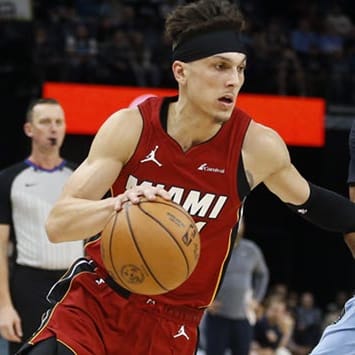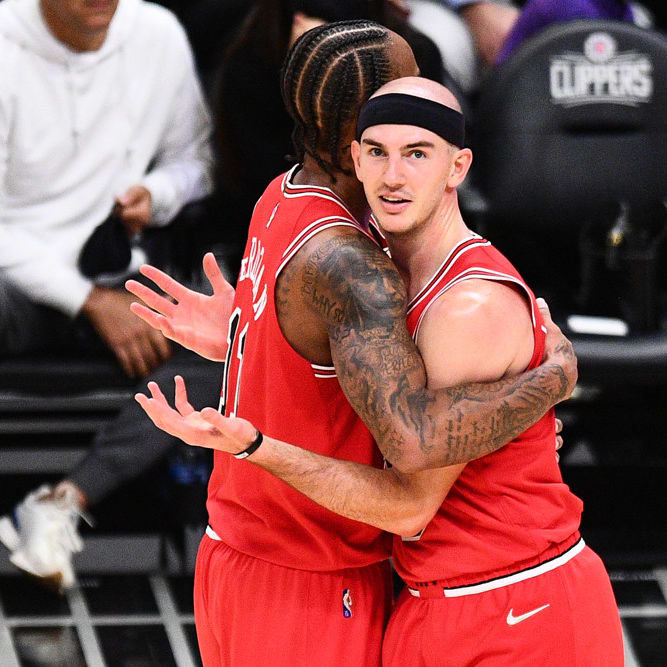This article is part of our Numbers Game series.
On Wednesday night, Stephen Curry scored 35 points, dished seven assists and grabbed three rebounds. Whether you play fantasy through ESPN, CBS, Yahoo or your uncle who insists on managing the league with pencil and paper, Curry still posted 35, seven and three. Production is a constant.
If a player is not producing, he should be dropped, regardless of the host site. If someone gets hot, the should he picked up. It all sounds so obvious. But frequently that's not what happens.
Some solid producers, widely owned on one host site, are almost entirely forgotten on waivers on others. Struggling players have been cast aside in some places, but held onto in others. Understanding this phenomenon, and acting upon it, can drastically improve your fantasy team.
This article will look into what is actually happening, why, and what it means for your team.
It is OK that players are owned at different rates on different sites ...
Before I get into the meat of this column, I need to make one point clear. We should expect to find some differences in the ownership rates on different sites.
The majority of fantasy leagues use whatever format is standard for the host site. There are differences in these standard rules, and those differences impact who is owned on each team. For example, on CBS, standard leagues allow for a max of two centers in the starting lineup per team, while ESPN standard leagues can accommodate up to four. As a result, more
On Wednesday night, Stephen Curry scored 35 points, dished seven assists and grabbed three rebounds. Whether you play fantasy through ESPN, CBS, Yahoo or your uncle who insists on managing the league with pencil and paper, Curry still posted 35, seven and three. Production is a constant.
If a player is not producing, he should be dropped, regardless of the host site. If someone gets hot, the should he picked up. It all sounds so obvious. But frequently that's not what happens.
Some solid producers, widely owned on one host site, are almost entirely forgotten on waivers on others. Struggling players have been cast aside in some places, but held onto in others. Understanding this phenomenon, and acting upon it, can drastically improve your fantasy team.
This article will look into what is actually happening, why, and what it means for your team.
It is OK that players are owned at different rates on different sites ...
Before I get into the meat of this column, I need to make one point clear. We should expect to find some differences in the ownership rates on different sites.
The majority of fantasy leagues use whatever format is standard for the host site. There are differences in these standard rules, and those differences impact who is owned on each team. For example, on CBS, standard leagues allow for a max of two centers in the starting lineup per team, while ESPN standard leagues can accommodate up to four. As a result, more centers will be owned in ESPN leagues than in CBS.
ESPN standard leagues include only 10 players, while CBS and Yahoo default to 12. This will also change how often players are owned. The biggest impact is that it means most players will be more widely owned on Yahoo and CBS.
Other differences in settings and formats will also impact ownership rates, though to a far lesser degree.
... But those differences should typically be small
The average ownership rate of a top-100 player on CBS is 90.7 percent. On Yahoo, it is 85.2 and on ESPN it is 78.9. Throughout our analysis, this is what we should expect to find – generally speaking, players will be owned most often in CBS, slightly less often in Yahoo and the least in ESPN. Furthermore, the difference between the three sites should be relatively small. Most of the time, I found the ownership rates between the three sites differed by fewer than 20 percent, and often less than 15.
Many players see giant discrepancies in ownership rates
J.J. Barea is owned in 83 percent of leagues in CBS, 63 percent in Yahoo and 46 percent in ESPN. In competitive CBS leagues, he may be permanently off the waiver wire, while ESPN commentators are still including him in their articles about must-get free agents. Markieff Morris ranges from 97 percent in CBS to 57 percent in ESPN, a 40-point gap that more than doubles the normal variance between the sites.
While CBS is usually the site where players are most widely owned, that is not always the case. For example, J.R. Smith is owned 14 percent more often in Yahoo than CBS, and he sees a 31 percent difference between the three sites. Danny Green's 66 percent ownership in Yahoo doubles his 33 percent in CBS, which in turn doubles the 16 percent in ESPN. Jamal Crawford is owned more often in ESPN, 43 percent, than in CBS, 28 percent.
Why is this happening?
Will Barton started the season strong. During his first three games, he averaged 18.0 points on 50.0 percent shooting, in addition to 5.0 rebounds and 2.7 assists. But then he hurt his ankle, and he has not played since. Now more than two weeks and eight games since he last saw action, Barton is owned in 28 percent of ESPN leagues and 44 percent of Yahoo leagues – a difference at the edge of our expected range. But in CBS leagues, his ownership spikes to 76 percent.
Why is an injured Will Barton so much more desirable to CBS managers?
Because CBS managers had to pay for Barton. ESPN and Yahoo managers got him for free.
On CBS, Barton's Average Draft Position (ADP) was 115 – a 10th round pick, the final starting position, in a standard league. In standard Yahoo leagues, on the other hand, he was one of the last five picks, and in ESPN standard, Barton went undrafted. When Barton got hurt, three of four CBS managers decided to hold on their draft pick. ESPN and Yahoo managers had invested less in Barton, and thus were more willing to part with him.
The "Endowment Effect"
CBS managers hanging onto Barton have fallen victim to the Endowment Effect phenomenon that I argue is the single most destructive force in fantasy sports. The Endowment Effect is the idea that people value something more simply because they already own it.
Examples of this effect in action abound. Only four players in the top 250 are owned more often in ESPN than in CBS. All four players were drafted significantly earlier in ESPN drafts than on the other host sites.
ESPN projected Andre Iguodala to have a better season than did CBS and Yahoo. It ranked him higher in its predraft player rankings. So Iguodala's Average Draft Position (ADP) was 101, the first bench player in an ESPN standard league. Yahoo had him going four dozen picks later, as one of the final rostered players. CBS thought the least of him, and his ADP was so low that he was barely drafted in 14-team leagues – he was an afterthought in standard 12-team leagues. Iguodala ranks 203rd among fantasy players this season, far below what should be owned in standard leagues on any site. Yet he remains owned in nearly one in three ESPN leagues, more than twice as often as he is owned in CBS.
It also works in the other direction. ESPN's Free Agents page automatically sorts players by their ownership rate, while CBS's add/drop page sorts players according to their current production ranking. Furthermore, CBS's page does not even show a player's ownership percentage. As a result, when scarcely owned players suddenly start to perform, they are usually added on CBS days, or even sometimes weeks, before they are added on ESPN. As a consequence, ESPN managers see that the player is barely owned, and consider him less valuable.
One final example. After a month of games, if a player has emerged as a top-30 performer, he should be universally owned. Period. Full stop. This is borne out in reality, with one exception. Avery Bradley is by far the least-owned top-30 player. Bradley also had the lowest ADP of any top-30 player across all three host sites.
How can we use this?
The first step in solving a problem is identifying that you have a problem. Reading this article, you have already accomplished step one. Congratulations.
Step two is to use multiple sources for information. All three sites make their roster trend data publicly available – no matter where you play, you can easily see what is happening in other formats. ESPN and Yahoo show their adds and drops on a single page. CBS splits it into one page for acquisitions and one for drops. Especially if you play on ESPN, monitor CBS's adds page, since, usually, that is a forecast of what will happen on ESPN a few days later. Likewise, CBS players should track drops on ESPN and Yahoo because that could tell them they are holding onto a player past his sell-by date.
Finally, just make sure to balance players fairly when making decisions. Instead of considering, should I drop Player X to add Player Y, if possible, attempt the following mental exercise: imagine that you own neither player, and that you suddenly have a new open roster spot. If you own neither player, and are considering which is a better fit for your roster, you are more likely to compare the two on equal footing.
Specific players to consider
The following list shows the players among the top 250 who have the widest discrepancies in ownership. Inclusion here does not mean that these players should be immediately added, nor that they should be immediately dropped.
Inclusion here means that factors other than the player's individual production are impacting their ownership. These players are the ones who you should investigate more thoroughly. Some should be dropped, others should be added and still others make for sell-high or buy-low trade targets. These players are the ones who need to be subjected to more sober analysis than they are receiving.
Bismack Biyombo
Bojan Bogdanovic
Brandon Ingram
Brandon Jennings
Clint Capela
Courtney Lee
Danny Green
Dario Saric
Darren Collison
Deron Williams
Dion Waiters
Elfrid Payton
Emmanuel Mudiay
Ersan Ilyasova
Gary Harris
Ish Smith
JaMychal Green
Jeremy Lin
J.J. Barea
Joakim Noah
Josh Richardson
J.R. Smith
Justise Winslow
Kelly Olynyk
Kyle Korver
Marcus Morris
Marcus Smart
Markieff Morris
Matthew Dellavedova
Michael Kidd-Gilchrist
Nikola Mirotic
Ricky Rubio
Robert Covington
Rondae Hollis-Jefferson
Sean Kilpatrick
Sergio Rodriguez
Taj Gibson
Terrence Jones
Timofey Mozgov
Trevor Booker
Tyson Chandler
Wesley Matthews
Will Barton
Wilson Chandler










